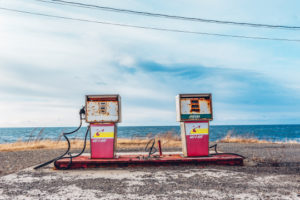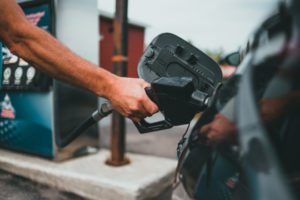Are you a car owner but live in a walkable neighborhood right around the corner from the local grocery store and coffee shop? You may own a second car that doesn’t see much action outside the garage. Many drivers will never need to worry about how long the gas in their tank has been sitting or about it going bad because it never has the chance to sit for long. How do you know if you have bad gas in your car? Let’s take a look.
How does gasoline go bad?
Those who rarely drive, or don’t drive their car at all, could be in store for a rude awakening because gasoline can become old and degrade if it’s just been left sitting for long periods. Tests conducted and published by Consumer Reports have shown that gasoline can begin to degrade in as little as three months.
There are two primary factors that cause gas to go bad:
 Water Contamination
Water Contamination
Severe complications can occur when water makes its way into a fuel tank. Moisture absorbed into gasoline can corrode the fuel system and obstruct the gas in your vehicle from reaching your engine. Similar scenarios during the cold winter months can easily produce enough condensation within the tank to freeze the gas line solid.
Since gas is usually stored underground, it’s common for residue and powder from rocks and water runoff to leak into gasoline storage containers. Storage issues like these effectively contaminate the entire gasoline supply before it even reaches the gas station for purchase.
Chemical Decomposition
The gasoline used to run your car comprises hundreds of distinct compounds. Many lighter, more volatile compounds tend to evaporate when gas has been left sitting for too long, often lowering the octane rating to such an extent that it won’t burn effectively inside the tank.
Recognizing the Symptoms of bad gas in your car
There are a few signals you may be driving around on a tank of bad gas.
Decreased Fuel Efficiency
Bad gas is a commonly used phrase for fuel that burns less thoroughly than most other gasoline on the market today. Thus, decreased fuel efficiency is one of the most significant symptoms of bad gas.
If you have suddenly noticed that your car is burning gas faster than it used to, chances are your most recent stop at the station included filling your tank with bad or low-grade gas. Have a trusted mechanic inspect your fuel tank if you have recently noticed diminished gas mileage.
Acceleration Issues
The quality of the gasoline in your tank directly connects to your vehicle’s acceleration power. Even a small portion of your tank filled with bad gas can result in a major loss of acceleration power on the road.
While a gradual reduction in power is normal and should be expected over the years, a sudden and steep dropoff in your car’s performance could be a symptom of bad gas. Drivers experiencing a sudden lack of acceleration should visit a different gas station for their next fill-up to avoid another costly tank of lesser quality fuel.
 What do I do with a tank full of bad gas?
What do I do with a tank full of bad gas?
The best move you can make if you’ve noticed your car dealing with any of these symptoms is to bring it into an auto shop for inspection by a mechanic. They can examine the gas inside your vehicle and the fuel system to correct and fine-tune the issue.
Gasoline is dangerous and flammable; working with it and pressurized fuel systems is a task for a qualified and highly trained professional.
Car Repair and Maintenance With T3 Atlanta
Whether your car is sputtering and in dire need of help due to a bad tank of gas, or you need a reputable auto shop to keep your trusted steed maintained and in top condition, T3 Atlanta can keep your car running for the long haul. Providing a beacon for Lexus, Toyota, Nissan, and Infiniti drivers, we have been Atlanta’s trusted auto shop providing reliable and affordable service to the area for almost 30 years.
Contact T3 Atlanta today to schedule an appointment with one of our experienced mechanics. We are prepared and excited to demonstrate how we can prolong the performance and reliability of your vehicle.










Leave a Reply
You must be logged in to post a comment.